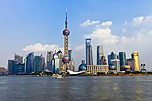About three years have passed since the eruption of the global financial crisis. Thanks to the joint efforts of the international community, the global economy is recovering. Yet there are still many destabilizing factors and uncertainties, and the recovery is fragile. Growth is uneven among countries; unemployment in developed economies remains high; government debt risks in some countries have mounted; and global inflationary pressure is increasing. While the shock of the financial crisis has yet to be removed, new risks have emerged. The international community must work closely together to meet these challenges.
China has taken swift steps to fight this severe international financial crisis. It has adjusted the macroeconomic policy to expand domestic demand and introduced a stimulus package to maintain growth, adjust the economic structure, advance reform and improve people's lives. By taking these steps, we have overcome extreme difficulties, ensured people's well-being, and laid a solid foundation for China's future development.
A notable result of China's response to the financial crisis is that it has maintained steady and fast economic growth. Between 2008 and 2010, China's GDP grew at an annual rate of 9.6%, 9.2% and 10.3% respectively. CPI over the same period was 5.9%, -0.7% and 3.3%. 33.8 million new urban jobs were created. China has maintained sound growth this year.
The thrust of China's response to the financial crisis is to expand domestic demand and stimulate the real economy, strengthen the basis for long-term development and make economic growth domestically-driven. We have implemented a two-year, four-trillion yuan investment program covering infrastructure development, economic structural adjustment, improving people's well-being and environmental protection. As a result, 10,800 kilometers of railways and about 300,000 kilometers of roads have been built and 210 million kilowatts of installed capacity for power generation have been added. We have significantly boosted support for science and technology by launching key science and technology projects and encouraging companies to carry out technological upgrading and innovation. Over one trillion yuan have been spent in post-Wenchuan earthquake reconstruction. In the earthquake areas, quality infrastructure and public facilities were constructed , and 4.83 million rural houses and 1.75 million urban apartments were rebuilt or reinforced. The quake-hit areas have taken on a new look. We are working to improve balance between domestic and external demand, with the share of trade surplus in GDP dropping to 3.1% in 2010 form 7.5% in 2007. China's rapid economic growth and big increase in import serve as an engine driving global economic recovery.
In fighting the financial crisis, China has made major strides in developing social programs, something that was beyond our means just a few years ago. Breakthroughs have been made in building a social security system covering both urban and rural areas. A rural old-age insurance scheme has been introduced which will cover 60% of counties in China this year. The basic urban medical insurance scheme and rural cooperative medical care scheme are now fully established, covering over 90% of China's population. All the Chinese now have access to free compulsory education. Government spending on education has grown to 3.69% of GDP.
In fighting the financial crisis, China has pursued both flexible and prudent economic policies and ensured that such policies are forward-looking, targeted and sustainable. China's budget deficit and debt balance are respectively below 3% and 20% of its GDP. Government budget deficit has been cut in both 2010 and 2011. Since mid-2009, we have used monetary policy tools to absorb excess liquidity. In the fourth quarter of 2009, to strike a balance between maintaining steady and fast growth, conducting economic structural adjustment and managing inflation expectations was set as the main goal of macroeconomic regulation. Since January 2010, the required reserve ratio and benchmark deposit and lending rates have been raised 12 times and four times respectively. As a result, growth in money and credit supply has returned to normal. In June 2010, reform of the RMB exchange rate regime was further advanced, and the RMB has appreciated 5.3% against the US dollar.
There is concern as to whether China can rein in the current inflation and sustain its rapid development. My answer is an emphatic yes.
Rapid price rises pose a common challenge to many countries, especially other emerging economies and China. China has made capping price rises the top priority of macroeconomic regulation and introduced a host of targeted policies. These policies have worked. The overall price level now is within a controllable range and is expected to drop steadily. Grain output in China has increased for seven consecutive years, and there is abundant supply of grain. There is an oversupply of main industrial products and import is growing fast. We are thus confident that price rises will be firmly under control this year.
China is now at a new historical starting point in its development endeavor. We have adopted the 12th Five-Year plan which calls for shifting the development model under the guidance of the Scientific Outlook on Development. We will continue to pursue economic structural adjustment, boost R&D and education, save energy and resources, promote ecological and environmental conservation, and narrow the regional and urban-rural gap. China's industrialization and urbanization drive is gathering pace, and its economy is becoming increasingly market-oriented and internationalized. We are thus fully capable of sustaining steady and fast growth of China's economy.
China will continue to work with other countries as partners to shoulder common responsibilities, help each other in times of difficulties, and pursue mutual benefit based on fairness and justice. We should make concerted efforts to strengthen coordination of macroeconomic policies, fight protectionism in all forms, improve the international monetary system and jointly tackle climate change and other global challenges. We should welcome the fast development of emerging economies, respect each country's choice of development model, scale up assistance to least developed countries to enhance their capacity for self-development, and promote strong, sustainable and balanced growth of the global economy.




